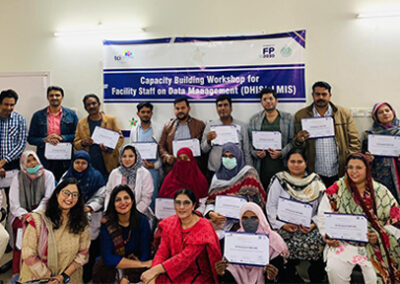 The Challenge Initiative (TCI) has just published a nine-article supplement in the peer-reviewed journal Global Health: Science and Practice, focusing on TCI’s experience supporting local governments to scale up family planning (FP) and adolescent and youth sexual and reproductive health (AYSRH) services. This comprehensive supplement offers valuable insights into the implementation and sustainability of high-impact practices across diverse contexts, particularly in low- and middle-income countries (LMICs).
The Challenge Initiative (TCI) has just published a nine-article supplement in the peer-reviewed journal Global Health: Science and Practice, focusing on TCI’s experience supporting local governments to scale up family planning (FP) and adolescent and youth sexual and reproductive health (AYSRH) services. This comprehensive supplement offers valuable insights into the implementation and sustainability of high-impact practices across diverse contexts, particularly in low- and middle-income countries (LMICs).
Over recent decades, significant progress has been made in identifying effective family planning strategies, encompassing service delivery, social and behavioral change, and new contraceptive methods. Despite this progress, a persistent evidence-to-practice gap has hindered the widespread adoption and scaling of these interventions, especially in urban areas of LMICs where rapid urbanization and political decentralization present unique challenges and opportunities. Addressing the health needs of marginalized urban populations is crucial for achieving sustainable development outcomes, particularly given projected demographic trends.
Key Findings:
Scaling and Sustainability of Family Planning Interventions
In four articles focused on FP, the supplement provides critical insights into the strategies and practices necessary for effectively scaling and sustaining interventions. These findings emphasize the importance of local government ownership, innovative financing models, and the integration of FP services into existing health systems. The articles collectively highlight the need for adaptive management, continuous stakeholder engagement, and a strong emphasis on sustainability to ensure that FP interventions can be successfully scaled and maintained in diverse contexts.
- Challenges and General Lessons: The articles collectively highlight the importance of politics, policy, local government ownership, and adaptive management in scaling FP interventions. Emphasizing sustainability, they advocate for continuous local stakeholder engagement and the design of interventions adaptable to new contexts. An overview article delves into the research on scaling family planning programs and TCI’s experience thus far.
- Case Studies and Comparative Analyses: Ishola et al.’s mixed-methods comparative case study in Nigeria demonstrates that political and managerial capacity, rather than just technical knowledge, is critical for successful FP intervention adoption and scale-up. The importance of local government capacity-building is underscored.
- Innovative Financing Models: Igharo et al. describe a co-financing model in Nigeria that incentivized state governments to allocate and release funds for FP, resulting in increased financial commitment and resource optimization. This model enhanced fiscal accountability and transparency, showing promise for scaling domestic financing.
- Local Municipality Engagement: Kandji et al. highlight the successful implementation of Family Planning Special Days (FPSDs) in Francophone West Africa, where local municipalities provided free FP services on specific days, strengthening collaboration and ownership among municipalities and health systems.
Scaling AYSRH Interventions
Through five articles, the supplement explores the unique challenges and opportunities associated with scaling AYSRH interventions. The findings stress the importance of tailored programming that addresses the specific needs and barriers faced by adolescents and youth. By leveraging existing health systems, engaging the private sector, and ensuring quality improvement processes, the articles demonstrate how comprehensive and youth-friendly services can enhance contraceptive uptake and improve overall SRH outcomes for young people.
- Adolescent Contraceptive Uptake: Global trends show increased contraceptive uptake and decreased unmet need for modern methods among adolescents, contributing to reduced pregnancy and childbearing rates. However, regional disparities and persistent barriers remain, particularly in LMICs.
- Tailored Programming: The supplement emphasizes the importance of adolescent- and youth-friendly services (AYFHS), including comprehensive strategies that address barriers such as limited knowledge, stigma, lack of sexuality education, and provider bias. The WHO’s guidance on AYFHS is highlighted as a framework for effective intervention design. Sharma et al. describes how TCI tailored information and counseling on contraceptive methods for young married and first-time parents in India.
- Program Strategies and Community Engagement: Bwire et al. describe a Ugandan program that integrated AYSRH services into existing FP structures, showing increased contraceptive uptake among both adolescents and women of reproductive age. The program combined facility-level changes with community sensitization, addressing multiple systems influencing AY access to SRH services.
- Quality Improvement Processes: Akila et al. and Avoce et al. discuss supportive supervision and quality assessment processes in Nigeria and Benin, respectively. These processes improved AY-responsive service quality, demonstrating the feasibility of adapting official monitoring tools to local contexts and driving significant increases in service uptake.
- Engaging the Private Sector: This article underscores the role of private sector outlets, such as proprietary patent medicine vendors (PPMVs), in providing AY with trusted health services. Effective public-private partnerships improved contraceptive information and service quality, enhancing AY access and uptake.
Lessons Learned and Broader Implications
One of the key lessons learned from TCI’s support of local implementation of family planning and AYSRH interventions is the crucial role of local ownership and investment. From the very beginning, ensuring that local governments are both financially committed and take ownership of the interventions is essential for sustained engagement and scalability. This local buy-in is fundamental to the long-term success of these health initiatives. Another vital component is effective advocacy. Advocacy efforts that build consensus among stakeholders and secure sustained financing are pivotal. These efforts help highlight the broader health and economic benefits of investing in family planning, which in turn encourages ongoing support and funding for health programs.
Utilizing existing government and health system structures has also proven to be highly effective. By working within these established frameworks, the initiatives can facilitate knowledge transfer, enhance skill development, and promote sustainable change without the need to create parallel systems. This approach not only streamlines implementation but also ensures that the interventions are integrated into the existing health infrastructure. Engagement of influential champions, such as religious, traditional, and other high-profile leaders, has been another critical factor in the success of these interventions. These leaders help build public support and hold governments accountable for providing family planning services, which is essential for maintaining momentum and achieving widespread impact. Finally, data-driven decision-making has been highlighted as a key to promoting sustainability. Using locally generated data for planning, decision-making, and monitoring improves the quality of these processes while reducing costs. This approach ensures that interventions are responsive to local needs and conditions, ultimately enhancing their effectiveness and sustainability.
The TCI supplement offers valuable lessons for scaling and sustaining evidence-based FP and AYSRH interventions across diverse contexts. By emphasizing local leadership, adaptive management, and data-driven approaches, the TCI model demonstrates the potential for achieving substantial and lasting impacts. This supplement provides a foundation for further discussions on sustaining these interventions and keeping the needs of target populations, particularly adolescents and youth, at the forefront of the global health agenda.







